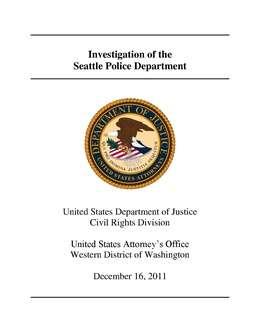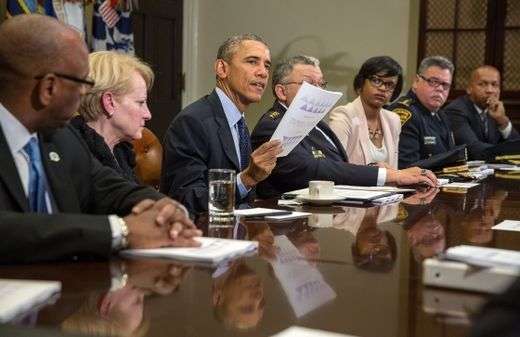Police reform in the United States
The history of law enforcement in the United States includes many efforts at police reform.
Early history
Early efforts at police reform often involved external commissions, such as the Wickersham Commission, that spelled out reforms but left to the police to implement them, often with limited success.[1]
1960s: the Johnson Administration and the Warren Court
In the 1960s, President Lyndon Johnson created the President's Commission on Law Enforcement and Administration of Justice. The Commission's final report, issued in 1967,[2] has been described as "the most comprehensive evaluation of crime and crime control in the United States at the time".[3] It laid out reorganization plans for police departments[4] and suggested a range of reforms.[5] Several of the Commission's findings related to the poor treatment of juvenile offenders.[6]
A series of U.S. Supreme Court decisions under the Warren Court led to important changes in policing, with respect to civil rights and constitutional law. Mapp v. Ohio in 1961 and Miranda v. Arizona in 1966 were two highly influential court decisions.[7] Mapp v. Ohio found that evidence obtained in violation of the Fourth Amendment protection against "unreasonable searches and seizures" may not be used in criminal prosecutions. Miranda v. Arizona required that criminal suspects must be informed of their right to consult with an attorney and of their Fifth Amendment right against self-incrimination prior to questioning by police. These decisions began to set national standards for policing.[8]
1970s and 1980s
Special commissions, such as the Knapp Commission in New York City during the 1970s, have been used to bring about changes in law enforcement agencies.[9] Civilian review boards (permanent external oversight agencies) have also been used as a means for improving police accountability. Civilian review boards tend to focus on individual complaints, rather than broader organizational issues that may result in long-term improvements.[10]
1990 to 2010
The 1994 Violent Crime Control and Law Enforcement Act authorized the United States Department of Justice's Civil Rights Division to bring civil ("pattern or practice") suits against local law enforcement agencies, to reign in abuses and hold them accountable.[11] As a result, numerous departments have entered into consent decrees or memoranda of understanding, requiring them to make organizational reforms.[12] This approach shifts focus from individual officers to placing focus on police organizations.
2010 to present
Some law enforcement agencies in the United States in the early 2000s and 2010s began to emphasize de-escalation as a method of conflict resolution and obtaining voluntary compliance.[13][14] There are also emphases on community policing to build relationships and community trust in law enforcement; the evidence-based policing approach of using of data to assist with decision-making; and the importance of civilian oversight of police work.[15][16][17]
In the 2010s, a series of shootings of unarmed individuals by police officers correlated with calls for police and law enforcement reform, especially regarding the diversity of police officers and the treatment of minorities by the criminal justice system.
In the specific case of the shooting of Michael Brown in Ferguson in August 2014, an investigation by the United States Department of Justice Civil Rights Division concluded that, while there were not sufficient grounds to charge the police officer who shot Brown with a criminal offense, the Ferguson Police Department as a whole "was routinely violating the constitutional rights of its black residents."[18][19] Members of the Congressional Black Caucus indicated their appreciation of U.S. Attorney General Eric Holder, and said that while many American police officers serve honorably, the problems found in Ferguson such as the use of fines to generate revenue instead of promote safety and justice, the use of excessive force, and unconstitutional practices may also be found in other communities in the United States.[20]
President Barack Obama created the President's Task Force on 21st Century Policing.[21] The commission issued a report on March 2, 2015, that made numerous recommendations. It did not call for all officers to wear body cameras, but did call for independent prosecutors to investigate civilian deaths in police custody or in officer-involved shootings.[22]
Sue Rahr, when she was sheriff of King County, had introduced a new policing model called L.E.E.D. (Listen and Explain with Equity and Dignity) in 2011, which influenced her later work on the "guardian model" of training police candidates when she became the executive director of the Washington State Criminal Justice Training Commission; Obama appointed Rahr to the President's Task Force, where the "guardian model" received support as a desirable alternative to the "warrior model" of training officers.[23][24][25][26] Rahr said in a U.S. House of Representatives Judiciary Committee hearing that, "When I talk about a guardian mindset... this is not a more kind and gentle way of doing the job. It's the opposite. We have increased firearms training and defensive tactics training, because we want to create strong, effective police officers who have the confidence that they don't [need] to behave in an intimidating manner. When someone has confidence, that helps deescalate as well. I think that when we were too focused on the boot camp method of training, it detracted away from our ability to train officers to be critical thinkers... What we have tried to shift towards is officer training, where you focus on critical thinking and confidence."[27]
A spokesperson for the American Civil Liberties Union said that the ideas in the report of the President's Commission "will significantly improve the relationship between law enforcement and the communities they serve" and that "For us to see meaningful change, local authorities must first implement data collection systems to improve transparency, use of force policies that emphasize de-escalation, eradicate all forms of biased policing, and improve community engagement and oversight to provide accountability."[28]
In response to the 2015 Baltimore protests, President Barack Obama said that "It's in [the interest of police officers] to root out [police] who aren't doing the right thing, to hold accountable people when they do something wrong, instead of just the closing-ranks approach that all too often we see that ends up just feeding greater frustration and ultimately, I think, putting more police officers in danger." Obama also said, "Unfortunately we've seen these police-related killings or deaths too often now, and obviously everybody is starting to recognize that this is not just an isolated incident in Ferguson or New York, but we've got some broader issues."[29]
Police leaders responded on January 29, 2016, with "Use of Force: Taking Policing to a Higher Standard" (http://www.policeforum.org/assets/30%20guiding%20principles.pdf). According to The New York Times, the new guideline call for police to use higher standards for use of force than those set by the U.S. Supreme Court (http://www.nytimes.com/2016/01/30/nyregion/police-leaders-unveil-principles-intended-to-shift-policing-practices-nationwide.html?_r=0). “This is a defining moment for us in policing,” said Charles Ramsey, the recently-retired commissioner of the Philadelphia Police Department, according to The Washington Post (https://www.washingtonpost.com/news/post-nation/wp/2016/01/29/police-chiefs-consider-dramatic-reforms-to-officer-tactics-training-to-prevent-so-many-shootings/).
Gallery
-

A 67-page report issued in 2011 about a Federal investigation of the Seattle Police Department
-

Police used tear gas during the Ferguson unrest in 2014.
-
.jpg)
An Occupy Chicago protest in 2012
-

Community policing in action: officers interact with the public in Des Moines, Iowa during Police Week 2010
-

President Barack Obama and members of the President's Task Force on 21st Century Policing meet with the press on March 2, 2015, to discuss the interim report of the task force.
See also
- Evidence-based policing
- Problem-oriented policing
- Prison reform
- Intelligence-led policing
- Predictive policing
- Proactive policing
- Stop-and-frisk
- Police accountability
- Police brutality in the United States
- Police misconduct
- Criminal justice
- Law of the United States
References
- ↑ Rumbaut, Rubén G. & Bittner, Egon (1979). "Changing Conceptions of the Police Role: A Sociological Review". Crime and Justice: A Review of Research 1: 239–288. doi:10.1086/449063. JSTOR 1147453.
- ↑ McGarrell, Edmund F. (1988). Juvenile Correctional Reform: Two Decades of Policy and Procedural Change. SUNY Press. p. 8. ISBN 978-1-4384-1243-6. Retrieved April 3, 2013 – via Google Books.
- ↑ Greene, Helen Taylor & Gabbidon, Shaun L. (April 14, 2009). Encyclopedia of Race and Crime. SAGE Publications. ISBN 978-1-4129-5085-5. Retrieved April 3, 2013 – via Google Books.
- ↑ Dempsey, John S. & Forst, Linda S. (January 1, 2011). An Introduction to Policing. Cengage Learning. p. 80. ISBN 978-1-111-13772-4. Retrieved April 3, 2013 – via Google Books.
- ↑ Giles, Howard (2002). Law Enforcement, Communication and Community. John Benjamins Publishing. p. 35. ISBN 978-1-58811-255-2. Retrieved April 3, 2013 – via Google Books.
- ↑ Hess, Kären M. & Drowns, Robert W. (June 26, 2009). Juvenile Justice. Cengage Learning. pp. 49–. ISBN 978-0-495-50437-5. Retrieved April 3, 2013 – via Google Books.
- ↑ Walker, Samuel (2005). The New World of Police Accountability. Sage. p. 29.
- ↑ Walker (2005), p. 30.
- ↑ Walker (2005), p. 20.
- ↑ Walker (2005), p. 37.
- ↑ "Department of Justice Police Misconduct Pattern or Practice Program (FAQ)". United States Department of Justice. Retrieved November 14, 2007.
- ↑ Walker (2005), p. 5.
- ↑ Miletich, Steve. "Federal judge approves key step in SPD reforms". Seattle Times. Retrieved 2015-04-17.
- ↑ Miletich, Steve. "Police training turning warriors into guardians". Yakima Herald Republic. Retrieved 2015-04-17.
- ↑ Bueermann, Jim (March 26, 2012). "Being Smart on Crime With Evidence-based Policing". Being Smart on Crime With Evidence-based Policing.
- ↑ Cordner, G.W. (2010). "Community Policing Elements and Effects". Critical Issues in Policing. Waveland Press Inc. pp. 432–449.
- ↑ Farrow, Joe (October 2003). "Citizen Oversight of Law Enforcement:Challenge and Opportunity". The Police Chief. The International Association of Chiefs of Police.
- ↑ Apuzzo, Matt (March 3, 2015). "Ferguson Police Routinely Violate Rights of Blacks, Justice Dept. Finds". The New York Times. Retrieved March 5, 2015.
- ↑ Perez, Evan & Bruer, Wes (March 4, 2015). "Justice Department: No Darren Wilson Charges". CNN. Retrieved March 5, 2015.
- ↑ Butterfield, G.K.; Clay, William Lacy, Jr.; Clyburn, James E.; Conyers, John, Jr.; Green, Al; Jackson Lee, Sheila; Lawrence, Brenda; Scott, Bobby; Waters, Maxine (March 4, 2015). "Congressional Black Caucus News Conference on Ferguson, Missouri Investigation". C-SPAN. Retrieved March 5, 2015.
- ↑ "President's Task Force on 21st Century Policing". www.cops.doj.gov. United States Department of Justice Community Oriented Policing Services.
- ↑ President’s Task Force on 21st Century Policing (March 4, 2015). "Interim Report of the President’s Task Force on 21st Century Policing" (PDF). United States Department of Justice. Office of Community Oriented Policing Services.
- ↑ Miletich, Steve (July 13, 2013). "Police Academy 2.0: Less military training, more empathy". The Seattle Times. Retrieved 2015-05-27.
- ↑ Wallis, Jim (March 6, 2015). "Police: From Warriors to Guardians". The Huffington Post. Retrieved 2015-05-27.
- ↑ "Editorial: The hammer of Justice falls on Ferguson". St. Louis Post-Dispatch. March 4, 2015. Retrieved May 26, 2015.
- ↑ Rahr, Sue; Diaz, John; Hawe, Joe. "The Four Pillars of Justice Based Policing: Listen and Explain with Equity and Dignity". www.portlandonline.com. Retrieved 2015-05-27.
- ↑ "Policing Strategies". c-span.org. Retrieved 27 May 2015.
- ↑ Bacon, Perry, Jr. (March 2, 2015). "Obama Police Commission Sidesteps Most Controversial Reforms". NBC News. Retrieved March 5, 2015.
- ↑ Pickler, Nedra. "Obama: police must hold officers accountable for wrongdoing". seattletimes.com. Associated Press. Retrieved 5 May 2015.
External links
- Community Oriented Policing Services (COPS) page from the U.S. Department of Justice
- President's Task Force hearing on the future of community policing in February 2015
- Final report of the President's Task Force on 21st Century Policing